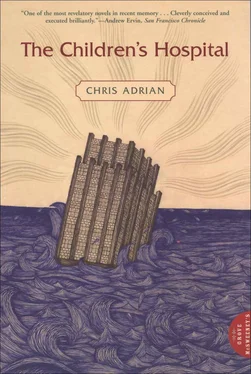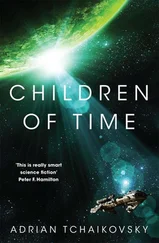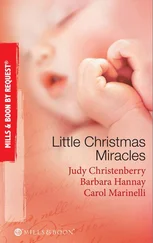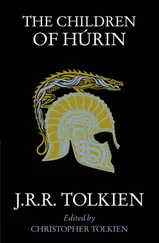Jemma and Rachel and a dozen other children on the beach were herded knee-high into the river by Elena and a few other older kids, out of the way of the food. Then they turned their faces to the sky and back to the earth again, watching the fight and the fireworks. Severna Forest was rightly said to have the best fireworks display east of DC. It went on while the fight intensified, red-white-and-blue peonies; silver swans; white stars that burst three times in succession to show a blue circle in their heart; red flares that burst green at their apogee and settled in shapes like trees into the water; a red, green, purple, and orange set, spheres of four different sizes that hung in the sky like a giant bowl of fruit for what seemed to Jemma to be forever — every explosion made Jemma’s stomach leap, her attention so consumed by what she saw that she did not hear herself exclaim with the people on the shore at every new explosion. For Jemma it was wonder piled on wonder, until the last, which seemed to explode just over her head, so she had to lean so far back she thought her hair would touch the water, a procession of flares in every color Jemma had ever seen, that exploded one by one, each one bigger and brighter than the last, each one touching her with a wave of force she felt break against her face, each one echoing in her eye and her head until she felt sure she must be suspended high in the sky. “Goodbye!” her brother shouted at her. She had waded close to the pier, and looking up she saw him there, framed against the explosions with his arms lifted up to the sky, as if he was summoning them out of the clouds, or hurling them out from his breast. “They are sending me!” he said. “Goodbye, I’m going!” In a panic, she clawed her way up a pylon and held on to his ankle, ready to be dragged after him into the sky. He shook his foot but she wouldn’t let go, and after the finale he was still just his ordinary self with his arms up. He sat down heavily next to her. On the beach people were still fighting and cursing, and Sheriff Travis turned on the lights on his patrol car, and started shouting on his bullhorn for people to calm down.
“Did you go?” Jemma asked her brother.
“What do you think?” he said.

I do not like your brothers, Pickie Beecher says. It is very early in the morning, and he sits on the edge of the roof, kicking his feet idly in the air and sipping at a packet of blood. I like every brother. Every brother lives in my heart, but these two… I do not like them.
Never mind them.
Angels hate me.
You are an orphan of creation.
Brother-killers, all of you. Even now brothers are dying, and what are you doing about it?
I am the recording angel.
Another and another and another. Death after death, and didn’t my mother undo death?
Not for everyone. But do not fear my brothers. The accuser has nothing to say to you, and the destroyer will not touch you. A different way has been prepared for you.
Death, he says.
Not death, I say. But life. Someone has died for the sake of everyone else’s happiness. Even yours.
Will I get to be with my brother again?
No, but the grieving for him will be done. You won’t want to anymore.
That is the most disgusting thing I have ever heard, he says.
You say that now. But how can you know what tomorrow will bring?
It is always the same. Every new day dawns, and my brother is still gone, and my whole life is one great aching after him.
I am supposed to say, Have faith. I am supposed to compare his small, strange mind, unfavorably, with the gigantic and subtle wonders of providence. But though I can feel those very words forming in the empty air of my chest, my own will and my angelic destiny shaping them together, I find I cannot speak them. They stick in my throat and feel as solid as a bone.
It’s hard, I say, to miss your brother or your sister
Sisters are nothing, Pickie says. And what do you know about, it, anyway? But then he reaches out beside him without looking at me, and takes my hand.

Rob was eating his lunch when Ishmael accosted him. He really should have eaten it on the way to the lab — he had a cell culture cooking there, and Dr. Sundae could not be relied upon to check it for him. He thought she probably had the botch in her brain, but he kept asking Jemma to check on it. He was salting his macaroni and cheese when Ishmael reached from behind him to put a hand on his wrist.
“There’s already enough salt in the sea,” he said. Rob shook his hand off. They weren’t exactly pals anymore. In a better, less exhausted world, somebody would have arranged an intervention for his erratic behavior. Off and on he was paranoid, and violent with himself. More than one person had seen him standing in some alcove off the ramp, pulling at his hair or biting his fingers. And there wasn’t a person above the age of twenty-one who hadn’t had him pop up and charge them with something improbable — stepping on a dodo or poisoning a mountain or uncoloring the sky. These accusations were almost quaint, but lately he seemed to like more and more to accuse people of wild vile sexual transgressions, and sometimes new mothers and fathers covered the ears of their children when he came around. And yet most of the time he was sober and clear-headed and totally normal, an able organizer and cheerleader for all their futile efforts against the botch.
“I like salt,” Rob said, not turning around to see which Ishmael was standing behind him. But he couldn’t eat with the man staring at the back of his head, so he said, “Want to sit down?”
“Don’t mind if I do,” Ishmael said, and took the spoon that Rob was going to use for his ice cream to help himself to the macaroni and cheese. “I miss you,” he said, around a mouthful.
“I miss you too,” Rob said, because his mother had taught him that you always had to say that back to people, even when you didn’t mean it.
“We used to be friends, didn’t we? Weren’t you my pal?”
“Sure,” Rob said.
“Golden days! I miss them too. I was happier then, back before I knew.”
“Well, we were all having a pretty good time there, for a while. Things are harder now. But it doesn’t mean that there’s not something good coming.” Ishmael laughed out loud at that, and Rob blushed, because it sounded so dumb. If he were someone like Father Jane he might be able to say the same thing in a way that would seem proudly hopeful instead of simply naïve.
“Maybe for somebody, but not…” Ishmael cocked his head, and put down his spoon, and leaned over the table. “You know, I was going to say, not for you. But who knows? And you’re not like everybody else, anyway. I mean, everybody knows it. You’ll get the Best Boy award, when this is all over, and they are all sitting around deciding who has been the Biggest Whore or the Whiniest Worm or the Handsomest Hip. I can see it.”
“Um… thanks.”
“It’s just a fact. Don’t thank me for it. There aren’t many like you… trust me! I see into all the places that people try to hide. It’s what I used to do, I’m sure of it. I illuminated and I judged and I wanted to punish. I wanted it so bad!” He struck a fist on the table, catching the edge of Rob’s bowl and sending macaroni flying.
“Take it easy there, pal,” Rob said.
“Pal! Now I’m your pal! Your long-lost, neglected pal! Well, that’s fine. Even if it does stand for Personal Ass Licker. That’s its own distinct pleasure, and don’t I know it?”
“Have you been drinking?” Rob asked him.
Читать дальше














